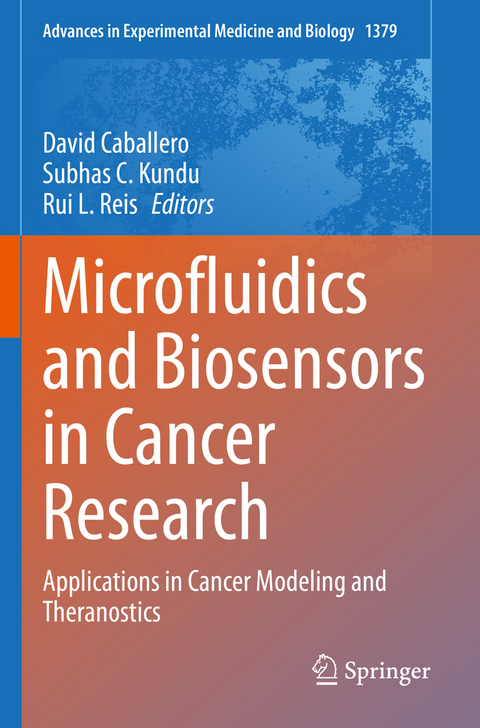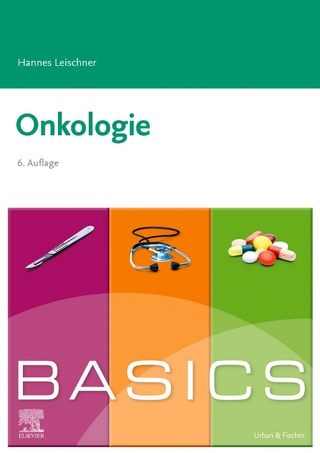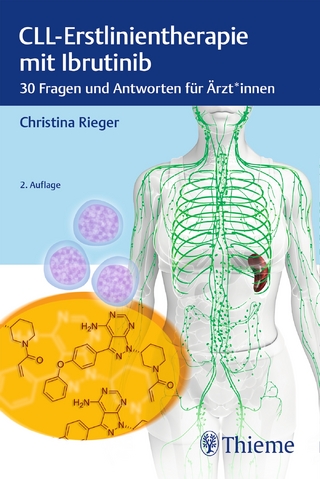
Microfluidics and Biosensors in Cancer Research
Springer International Publishing (Verlag)
978-3-031-04041-2 (ISBN)
This book offers a comprehensive overview of the development and application of microfluidics and biosensors in cancer research, in particular, their applications in cancer modeling and theranostics.
Over the last decades, considerable effort has been made to develop new technologies to improve the diagnosis and treatment of cancer. Microfluidics has proven to be a powerful tool for manipulating biological fluids with high precision and efficiency and has already been adopted by the pharmaceutical and biotechnology industries. With recent technological advances, particularly biosensors, microfluidic devices have increased their usefulness and importance in oncology and cancer research.
The aim of this book is to bring together in a single volume all the knowledge and expertise required for the development and application of microfluidic systems and biosensors in cancer modeling and theranostics. It begins with a detailed introduction to the fundamental aspects of tumor biology, cancer biomarkers, biosensors and microfluidics. With this knowledge in mind, the following sections highlight important advances in developing and applying biosensors and microfluidic devices in cancer research at universities and in the industry. Strategies for identifying and evaluating potent disease biomarkers and developing biosensors and microfluidic devices for their detection are discussed in detail. Finally, the transfer of these technologies into the clinical environment for the diagnosis and treatment of cancer patients will be highlighted.By combining the recent advances made in the development and application of microfluidics and biosensors in cancer research in academia and clinics, this book will be useful literature for readers from a variety of backgrounds. It offers new visions of how this technology can influence daily life in hospitals and companies, improving research methodologies and the prognosis of cancer patients.
lt;p>David Caballero is an experienced biophysicist with a MSc and PhD in Nanoscience from the University of Barcelona (Spain). Currently, Dr. Caballero is a senior Assistant Researcher at the 3B's Research Group, I3Bs - Research Institute on Biomaterials, Biodegradables and Biomimetics from the University of Minho (Portugal) working in the field of Physics of Cancer. His research is focused on unraveling the mechano-chemical mechanisms of cancer dissemination. For this, Dr. Caballero is using microfluidics, microfabrication tools, and cutting-edge screening technologies for his experiments that are the interface between cell biology and physics.
Subhas C. Kundu received his PhD in Genetics from Banaras Hindu University (India). His area of interest includes biomaterials for 3D cancer modelling and drug screening. Currently, Prof. Kundu is a Research Coordinator at the 3B's Research Group, I3Bs - Research Institute on Biomaterials, Biodegradables and Biomimetics of the University of Minho, where he leads a multidisciplinary team dedicated to developing a new generation of predictive in vitro 3D tumor models using engineered biomaterials.
Rui L. Reis is the Dean/President of I3Bs - Research Institute for Biomaterials, Biodegradables and Biomimetics, founding Director of the 3B's Research Group at the University of Minho, Full Professor of Tissue Engineering, Regenerative Medicine, Biomaterials and Stem Cells, the CEO of the European Institute of Excellence on Tissue Engineering and Regenerative Medicine, and the Director of the PT Government Associate Laboratory ICVS/3Bs from the University of Minho (Portugal). Prof. Reis was awarded with the IET Harvey Engineering Research Prize to create reliable breakthrough 3D engineered functional cancer disease models for an improved prediction and efficacy of cancer drugs.
Part 1. Fundamentals of Microfluidics and Biosensors.- Chapter 1. Fundamentals of Biosensors and Detection Methods.- Chapter 2. How to Get Away with Gradients.- Chapter 3. Sensors and Biosensors in Organs-on-a-chip Platforms.- Chapter 4. Current Trends in Microfluidics and Biosensors for Cancer Research Applications.- Part 2. Modelling the Tumor Microenvironment and Its Dynamic Events.- Chapter 5. The Tumor Microenvironment - an Introduction for the Development of Microfluidic Devices.- Chapter 6. Biomaterials for Mimicking and Modelling Tumor Micro-environment.- Chapter 7. Advancing Tumor Microenvironment Research by Combining Organs-on-chips and Biosensors.- Chapter 8. Microfluidic-driven Biofabrication and the Engineering of Cancer-like Microenvironments.- Chapter 9. Advances in 3d Vascularized Tumor-on-a-chip Technology.- Part 3. Cancer Detection and Diagnosis.- Chapter 10. Biosensors Advances: Contributions to Cancer Diagnostics and Treatment.- Chapter 11. Flexible Sensing Systemsfor Cancer Diagnostics.- Chapter 12. Coupling Micro-physiological Systems and Biosensors for Improving Cancer Biomarkers Detection.- Chapter 13. Microfluidic Biosensor-based Devices for Rapid Diagnosis and Effective Anti-cancer Therapeutic Monitoring for Breast Cancer Metastasis.- Chapter 14. Liquid Biopsies: Flowing Biomarkers.- Chapter 15. From Exosomes to Circulating Tumor Cells: Using Microfludics to Detect High Predictive Cancer Biomarkers.- Chapter 16. Microfluidics for the Isolation and Detection of Circulating Tumor Cells.- Chapter 17. Evolution in Automatized Detection of Cancer Cells: Advances in Magnetic Microcytometers.- Chapter 18. Droplet-based Microfluidic Chip Design, Fabrication and Use for Ultrahigh-throughput DNA Analysis and Quantification.- Chapter 19. Emerging Microfluidic and Biosensor Technologies for Improved Cancer Theranostics.- Part 4. Clinical Applications: Towards Personalized Medicine.- Chapter 20. Microfluidics for Cancer Biomarker Discovery, Research and Clinical Application.- Chapter 21. Methods for the Detection of Circulating Biomarkers in Cancer Patients.- Chapter 22. Advances in Microfluidics for the Implementation of Liquid Biopsy in Clinical Routine.
| Erscheinungsdatum | 01.07.2023 |
|---|---|
| Reihe/Serie | Advances in Experimental Medicine and Biology |
| Zusatzinfo | XIX, 590 p. 100 illus., 99 illus. in color. |
| Verlagsort | Cham |
| Sprache | englisch |
| Maße | 155 x 235 mm |
| Gewicht | 926 g |
| Themenwelt | Medizin / Pharmazie ► Medizinische Fachgebiete ► Onkologie |
| Medizin / Pharmazie ► Studium | |
| Schlagworte | Biomarkers • biosensors • Cancer Research • drug discovery • Drug Screening • microfluidics • nanotechnology • Oncology • pharmacology • Quantitative biology |
| ISBN-10 | 3-031-04041-4 / 3031040414 |
| ISBN-13 | 978-3-031-04041-2 / 9783031040412 |
| Zustand | Neuware |
| Informationen gemäß Produktsicherheitsverordnung (GPSR) | |
| Haben Sie eine Frage zum Produkt? |
aus dem Bereich


